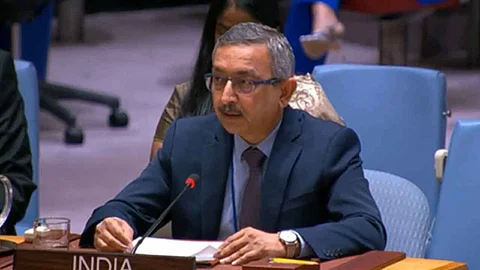

United Nations | India has reaffirmed its commitment to promoting a "free, open, and rules-based" maritime order at a UN Security Council debate, underlining that maritime security is a collective challenge that demands international collaboration.
Speaking at the UNSC High-Level Debate on Maritime Security on Monday, Tanmaya Lal, Secretary (West), Ministry of External Affairs, also highlighted key initiatives like Information Fusion Centre for Indian Ocean Region (IFC-IOR), e-Samudra, Samudra Prachet, IOS Sagar, Deep Ocean Mission and robust naval cooperation in the Indo-Pacific and beyond.
"India remains committed to promoting a free, open and rules-based maritime order in accordance with principles of UNCLOS (United Nations Convention on the Law of the Sea)," Lal said.
He said that genuine international cooperation is needed to meet the collective challenges to maritime security and prosperity. As a responsible maritime power, India stands ready to continue to contribute to these joint efforts, he added.
"Maritime security is our collective challenge and demands international collaboration," he said.
Given the critical importance of sea routes for global trade, energy supplies, and communication cables, India, as one of the world's largest economies, has strong stakes and interest in this subject, he added.
India shares maritime boundaries with seven nations, with a coastline of over 11,000 km and nearly 1,300 offshore islands and islets. It has an Exclusive Economic Zone spread over 2.3 million sq km, he said.
The scale of maritime safety and security challenges, as well as the urgent importance of economic stability and environmental sustainability, are concerns for India, Lal said.
"The twin inter-linked concerns of security and prosperity provide the basis for India's vision for maritime security – MAHASAGAR – the Hindi word for ‘Ocean', which was elaborated by Prime Minister Narendra Modi as - Mutual And Holistic Advancement for Security And Growth Across Regions," Lal added.
He said the Indian Navy is assisting with security and Humanitarian Assistance and Disaster Relief operations in the Indo-Pacific region, and is among the first responders.
"Recognising the collective nature of the challenges and the required joint response, we engage with our partners, especially from the Global South," he added.
Lal also talked about India's AI-powered digital platform called e-Samudra, which will be launched later this year for real-time monitoring and smarter decision-making to enable more efficient and transparent maritime governance.
Mentioning India's initiative in maritime environmental protection and sustainable practices, Lal said last month India launched "Samudra Prachet, its indigenously built Pollution Control Vehicle." He said India's approach to maritime security draws upon five principles: free flow of legitimate maritime trade; Peaceful dispute resolution under UNCLOS; Collective response to disasters & non-traditional threats; Marine environment protection, and encouraging responsible maritime connectivity.
